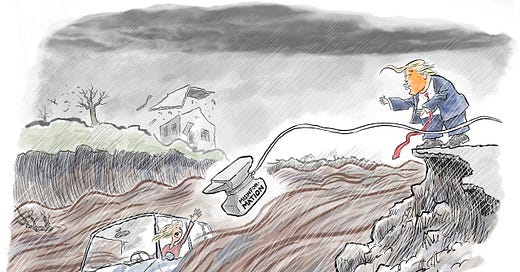Our Scorched Earth Existence
This mix of extreme weather and relentless disinformation is the new normal
Sree’s newsletter is produced with Zach Peterson (@zachprague). Digimentors Tech Tip from Robert S. Anthony (@newyorkbob). Our sponsorship kit. Cartoon by Nick Anderson, Counterpoint.
🗞 @Sree’s #NYTReadalong: Sunday mornings, 8:30-10 am ET, we read a print newspaper aloud on social media with a fab guest. We’ve been doing this for 9 years. Videos of our six most recent guests: Subodh Chandra, Rajesh Vetcha, Marcia Stepanek; Melissa Ludtke, Eric Weiner, Cauvery Madhavan. Check out our archives here. The Readalong is sponsored by Muck Rack. Interested in sponsorship opportunities? Email sree@digimentors.group and neil@digimentors.group.
🤖 Am teaching my “Non-Scary Guide to AI” workshops in person and via Zoom. 30 minutes to three hours to three days, fully customized for your audience. LMK if you’d like to chat. Or if you need help with AI strategy, policy or scenario planning. Here’s the brochure: bit.ly/sreeai2024.
***
EXTREME CLIMATE EVENTS AND MIS-/DIS-INFORMATION ARE THE NEW NORMAL. Hurricane Helene’s destruction, and the digital flood of bad information—about FEMA, about a non-existent second storm, about a dam that was (not) in danger of breeching—should serve as a sober awakening to our new reality.
✔ Apply for FEMA relief funds here
💲 Donate to hurricane relief efforts here
We are, right this minute, living through a climate crisis that is almost entirely of our own making. The next election has been “The Climate Election” for the last two decades at least, but it all feels a little more real these days, and we’ve never been worse at convincing people to see what’s right in front of them.
This Washington Post piece on all of the back-and-forth sums it up nicely, and is probably a good template for reports on such matters for the foreseeable future. State and local GOP politicians have taken to social media asking people to stop sharing misleading info and falsehoods, a sign that things really have gotten bad.
Naturally, it’s the people who have buried themselves neck-deep in a sort of scorched-earth anti-government nihilism who are the main vectors of mis- and dis-information—Donald Trump and Elon Musk are in a double-down-on-awfulness contest and neither one of them knows it.
The recipe is nothing new—make something up, post it with “people are saying…” or “I’m hearing…”, then obstinately reply to every single response. Eventually a couple right-wing grifter-types will amplify the claim and it will bubble up to Musk, who will happily spread any rumor that he thinks will somehow “own the libs.” His actions will absolutely have very negative, very real consequences for people who may have lost everything already—and there’s little anyone can do about it.
This is from a Politico report on the whole thing and yes, it’s awful:
On his social network, X, Musk also amplified rumors that authorities in North Carolina had “taken control to stop people helping” stricken residents and accusations that sheriffs were threatening to arrest FEMA staff “if they hinder rescue and aid work.” Many of his allegations centered on the claim that immigrants had already depleted federal disaster funds, which FEMA has said is untrue.
“FEMA used up its budget ferrying illegals into the country instead of saving American lives. Treason,” Musk wrote without evidence on X, where he interspersed messages about hurricane damage with political attacks on Democrats.
Of course, none of this is true, has been repeated by MAGA folks for days now, and there is another, more severe hurricane coming. This is what decades of shoving “government help is for socialists” rhetoric down people’s throats has wrought—people simply do not trust the government, and the government is not capable of a truly full-throated relief response because of what that mistrust has bred in our politics.
The GOP really started tearing down the very idea of the administrative/social during the Reagan years, accelerated that during the Gingrich years, saw it devolve into a weird libertarian fever dream in the form of the Freedom Caucus in Congress, and they’ve fed us this garbage with a firehose for 40 years. Unsurprisingly, a huge swathe of the country has eaten it up, even when anti-state conservatism is very obviously robbing them of precisely the thing the state is for, the protection of its people.
This has always confounded me about modern Republican party politics—the willingness of so many people who could benefit from government assistance to vote so consistently against the very idea of government assistance—there are a lot of GOP-led states on the map below, that’s for sure. But, I don’t share this map as a gotcha, quite the contrary. This map shows how important we all are to each other here. When the hurricane sweeps everything away, some oil company isn’t going to feed people, get insurance claims expedited, and provide money for expenses—the government does that. WE do that, and it’s great.
More fundamentally, it’s all on fire. Extreme weather events have become the norm—more frequent and powerful hurricanes, wild fires that darken continents, catastrophic floods—and the same can be said for the information space writ large. The fake news beat isn’t a new one, but I can’t remember a time when the aftermath of a natural disaster had so much mainstream reporting about mis- and dis-information. This is, of course, one of the goals of the whole thing—clouding the discussion. In a way, it’s great to see that everyone right up to the President of the United States is on the case, but on the other, sadder side, it inspires little in the way of optimism.
The fact is, the transfer of sometimes-life-saving information has never been easier. We’ve never been able to warn and inform like we can tomorrow, and it’s truly a feat. But, just as the Earth is changing and reacting to our over-pollution, profit-chasing, no-holds-barred world of commerce, which sounds a lot like the news industry specifically and our information systems writ large. Read these accounts from photographers on the ground after Hurricane Helene and imagine tweeting some weird lie about FEMA seizing properties or something…it’s just so terrible.
Charlie Warzel, who has covered this for a long time, wrote one of the better laments for the Information Age that we have squandered for The Atlantic. From the piece:
Even in a decade marred by online grifters, shameless politicians, and an alternative right-wing-media complex pushing anti-science fringe theories, the events of the past few weeks stand out for their depravity and nihilism.
As two catastrophic storms upended American cities, a patchwork network of influencers and fake-news peddlers have done their best to sow distrust, stoke resentment, and interfere with relief efforts. But this is more than just a misinformation crisis.
To watch as real information is overwhelmed by crank theories and public servants battle death threats is to confront two alarming facts: first, that a durable ecosystem exists to ensconce citizens in an alternate reality, and second, that the people consuming and amplifying those lies are not helpless dupes but willing participants.
The heartbreaker here is that the only people who are going to read the American Meteorological Society’s best practices on sharing weather and climate information are not exactly the people who need to see that sort of thing. That community needs to be the power user group that can somehow wedge its way into an online information cauldron that has become overrun with algorithm-gaming (and, algorithm-owning) bad actors.
The same is true in every niche online community—we, and I mean us, together, dear reader—need to be the best we can be at sharing the facts and helping other people share the facts. Teach your kids how to truly verify things, how to be skeptical in a healthy way. Do the same with your uncle, or your grandma, or your neighbor who watches Newsmax all day. The fact is that math is not the side of the truth in our digital information space—the algorithm-ization of modern communication puts a premium on Quality Digital Content over truthful reporting 9 times out of 10, and the shareholders have spoken at the Googles and Facebooks of the world: There’s no money in peddling news.
The truth needs to come from someone trusted, whatever the medium. Do what you can to be a responsible news and information consumer and pay it forward. The world quite literally depends on it.
— Sree | Twitter | Instagram | LinkedIn | Facebook | YouTube / Threads
Promotional message
EVENT | South Asians Stand-Up for Kamala
In the most consequential election in history, we know laughter can unite as we see VP Harris’s great laugh and push for a new positive way forward. Now South Asians across the world of comedy unite in laughter behind Kamala as we get ready for the final stretch of this campaign. Learn more: bit.ly/southasianslaugh2024
DIGIMENTORS TECH TIP | Watts Up? Can Anything Slow AI’s Ravenous Power Demands?
By Robert S. Anthony
Each week, veteran tech journalist Bob Anthony shares a tech tip you don’t want to miss. Follow him @newyorkbob on Twitter and check out his 1.1 million followers on Pinterest!
Everything has its price, as the old saying goes, and with generative artificial intelligence (GenAI), the price is power, lots of it, enough to warm up the entire planet—and that’s a rather big problem.
Hunting for information online has come a long way from ancient search engines such as Webcrawler, which somehow still exists, and the original human-edited version of Yahoo, but with automation and sophistication has come huge, power-hungry computer centers and server farms to power today’s search engines.
GenAI, however, with its ability to write complete novels and create videos out of what seems to be thin air, requires far more electricity and cyberpower to accomplish its magic. One query to ChatGPT, the most popular of the GenAI platforms, uses ten times more power than a simple AI-free Google search, according to research firm EPRI.
“At 2.9 watt-hours per ChatGPT request, AI queries are estimated to require 10x the electricity of traditional Google queries, which use about 0.3 watt-hours each; and emerging, computation-intensive capabilities such as image, audio, and video generation have no precedent,” said EPRI.
These power demands add up quickly. According to Digiconomist, which describes itself as “a platform that is dedicated to exposing the unintended consequences of digital trends,” AI globally could soon account for as much power consumption as a small country.
“AI servers are power-hungry devices,” said Digiconomist. “A single NVIDIA DGX A100 server can consume as much electricity as a handful of US households combined.”
Part of the problem, it said, is the widespread use of AI unnecessarily. “Emerging technologies such as AI and previously blockchain are accompanied by a lot of hype and fear of missing out,” said Digiconomist. “This often leads to the creation of applications that yield little to no benefit to the end-users.”
It might seem strange to talk about saving energy in Las Vegas, where the bright lights of The Strip are always on, but AI, sustainability and climate change will all be on the docket January at CES, the annual technology mega-show. Tech giants such as Nvidia, Intel and AMD, all of which have excellent track records of consistently rolling out computer chips more powerful and efficient than previous generations, will be at CES. But the question is: Can they keep up with the demand for AI-powered services?
One possible answer to power-efficient AI is evolving some 400 miles away near Reno, Nevada, whereSwitch Inc. is building what it calls “the world’s most powerful colocation data center campus.” While it will be able to provide up to 650 MW of power to its many servers, it will do so with only renewable energy: solar, wind and geothermal. Now that’s a powerful concept.
Did we miss anything? Make a mistake? Do you have an idea for anything we’re up to? Let’s collaborate! sree@sree.net and please connect w/ me: Twitter | Instagram | LinkedIn | YouTube / Threads










Thank you for writing about this. Weather patterns, even when not obviously extreme, have been disrupted. For instance, in the NE of the US, there are fewer days of blah-blah rain, you know, wet but not intense. Instead we have huge downpours. City dwellers who have municipal water pumped in from reservoirs may be less aware of the effect of this weather pattern than ex-urban and rural folks who rely on wells on their properties. Since sometimes it doesn't rain for two weeks or more at a time, the ground becomes dry and can't absorb as much water. Thus the well-levels go down. The huge amount of water from these heavy rain events runs off, eventually getting into the ocean, which contributes to the rising water levels there. I believe that water levels in NYC are about normal — about 4% below normal — but people who have their own wells are concerned.